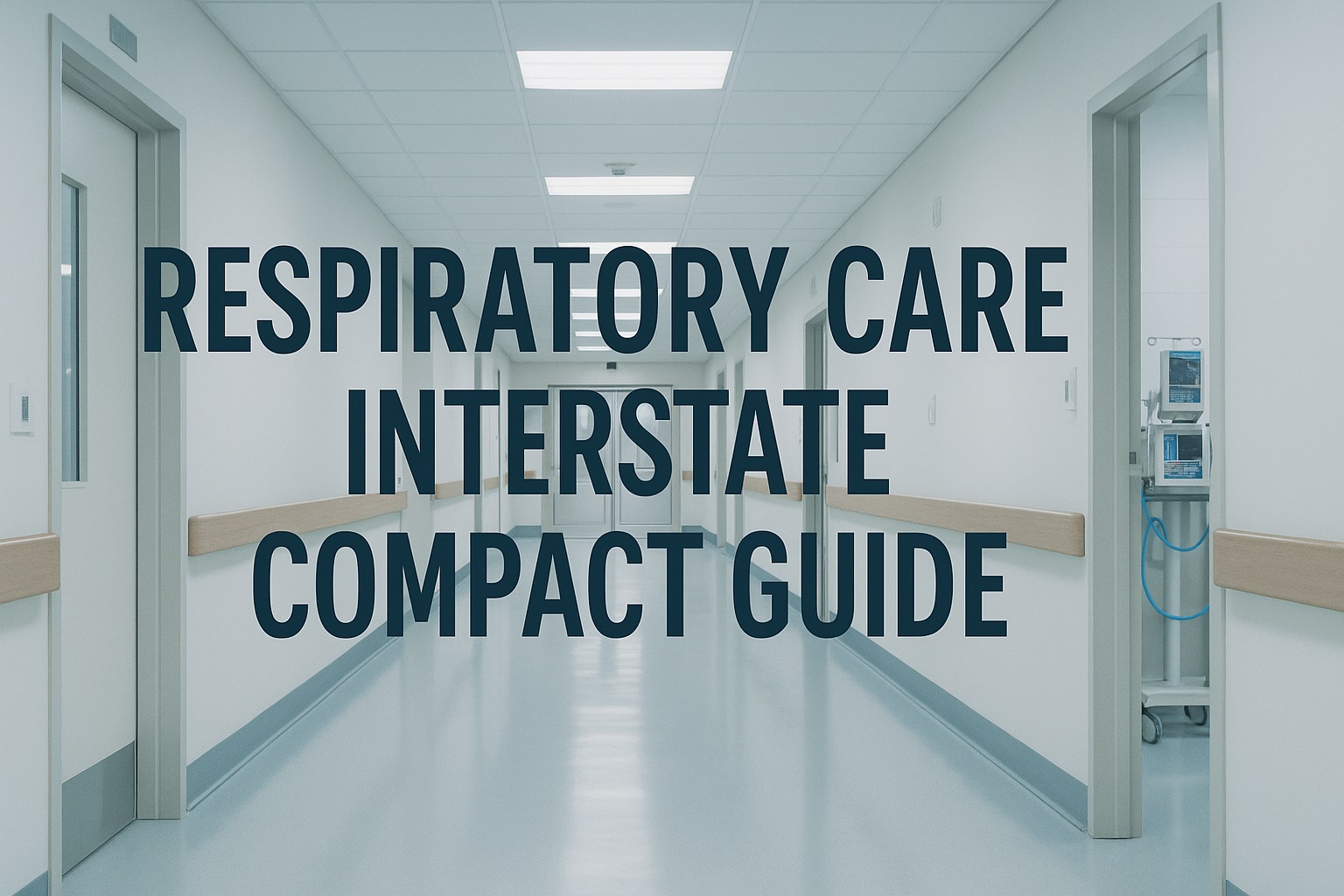If you’re a respiratory therapist looking for more flexibility in your career, the respiratory care interstate compact (RCIC) is something you’ll want to keep on your radar. Much like nurses benefit from the Nurse Licensure Compact, respiratory therapists now have their own multistate licensing pathway. This compact makes it easier to practice in multiple states without going through the exhausting, time-consuming process of applying for separate licenses everywhere you work.
At Junxion Med Staffing, we know how important mobility is for allied health travelers. Whether you’re comparing pay across professions (like who makes more respiratory therapist or rad tech), or just trying to figure out which states you can legally work in next, we’ve got your back. This guide breaks down everything you need to know about the respiratory care interstate compact.
What Is the Respiratory Care Interstate Compact?

The respiratory care interstate compact (RCIC) is a multistate licensing system created to give respiratory therapists a streamlined way to practice in more than one state. It was developed by the American Association for Respiratory Care (AARC) in partnership with the Council of State Governments (CSG) and supported by the Department of Defense.
Here’s what it means for you: once your state joins the compact and you’re approved, you’ll be able to practice in any other participating compact state without needing to go through a brand-new license application every time.
This is especially valuable for travel respiratory therapists who want to move between states frequently, pick up short-term contracts, or be available quickly when staffing shortages arise.
Why the Respiratory Care Interstate Compact Matters
Licensing has always been one of the biggest headaches for respiratory therapists. Each state has its own rules, fees, and processing times. For travelers, that can mean delays between assignments and a lot of wasted money.
The respiratory care interstate compact tackles those challenges head-on by:
- Making licensure portable between member states.
- Helping RTs get started on assignments faster, with less paperwork.
- Supporting military families who relocate often and need license flexibility.
- Improving access to patient care in underserved areas by reducing staffing bottlenecks.
For respiratory therapists who are part of the travel healthcare community, this compact is more than just a legal change, it’s a career accelerator.
How the Compact Works with Licensing and Renewal

One common question is how the compact fits with your existing responsibilities, like respiratory licence renewal. The compact doesn’t replace your main license, it builds on it. You’ll still need to keep your home state license in good standing, which means staying on top of renewals, continuing education, and any requirements from your board of respiratory therapy.
Think of it this way: your primary respiratory care license acts as the foundation. The compact simply extends its reach, letting you practice across borders in states that have signed on. If your home license lapses, your compact privileges disappear too.
What States Are in the Respiratory Care Interstate Compact?
The compact is still rolling out, and states are adopting it one by one. As of 2025, here’s where things stand:
Enacted / Compact Members (you’ll be able to practice across these once the system is active):
- Washington
- Montana
- Missouri
- Tennessee
Legislation Filed / Pending (states moving toward membership):
- Wisconsin
- Ohio
This list will grow as more state legislatures pass compact bills. If you’re planning your travel career, it’s smart to keep an eye on updates from the AARC and your state’s licensing board.
Eligibility Requirements
Not every respiratory therapist automatically qualifies. To practice under the respiratory care interstate compact, you’ll generally need to:
- Hold a full, unrestricted license in your home state (which must be a compact member).
- Meet renewal and continuing education standards.
- Have no history of disciplinary action or unresolved investigations.
- Have no record of controlled substance violations.
The compact is designed to make life easier for qualified RTs while maintaining strong patient safety standards.
Benefits for Travel Respiratory Therapists
If you’ve ever had to put off an assignment because your license paperwork wasn’t ready, you already know how important this compact is. For travelers, the benefits include:
- Faster contracts: Less downtime between jobs since you don’t have to wait for every state to process an application.
- More options: Open up contracts in multiple states without extra red tape.
- Financial consistency: Keep income flowing smoothly by reducing gaps between assignments.
- Lower stress: Fewer forms, less frustration, and more focus on your patients.
When combined with resources like Junxion’s helpful allied health traveler links, the compact gives respiratory therapists the freedom to map out their career on their own terms.
How This Impacts Allied Health Travelers
Respiratory therapists aren’t the only allied health professionals who can benefit from compact-style licensing. Similar systems exist for nurses and physical therapists, and others may follow. For respiratory care, the compact creates long-overdue parity with other professions and levels the playing field for travel opportunities.
If you’re weighing options between allied health paths, say, considering respiratory therapy versus another field, t’s worth noting how much easier the compact makes mobility. Our guide to who makes more respiratory therapist or rad tech is a helpful comparison if pay is a big factor in your decision.
How to Get Started

So, what should you do if you want to take advantage of the compact? Here’s a simple roadmap:
- Check if your state is a member: Only compact states are eligible. If your home state hasn’t joined yet, you’ll need to wait.
- Keep your license current: Stay on top of your renewals and CEUs. Your respiratory care license must remain active.
- Apply when available: Once your state is live, you’ll go through a compact application process.
- Stay informed: Monitor state and AARC updates so you know when new states join.
And remember—if you’re ever unsure how compact participation works with your unique situation, Junxion is here to help. You can contact us anytime for support.
Compact Challenges and Considerations
The compact is a huge step forward, but it’s not perfect. Some challenges include:
- Limited adoption (for now): Only a handful of states have joined so far.
- Upfront costs: There may be fees for compact membership on top of your home license.
- Variability: Each state has its own legislative timeline, so full nationwide coverage will take years.
Still, these are small trade-offs compared to the benefits of broader mobility and fewer licensing headaches.
Tying It All Together
Respiratory therapists have always been in demand, but the system hasn’t always made it easy for them to move where they’re needed most. The respiratory care interstate compact changes that, offering freedom, flexibility, and faster access to jobs across the U.S.
Whether you’re renewing your license, applying through your state’s board of respiratory therapy, or mapping out your next contract with the help of guides like our OH license guide, the compact is the missing piece that makes travel respiratory therapy a smoother career path.
At Junxion Med Staffing, our mission is to support allied health travelers every step of the way. From explaining licensing rules to connecting you with the highest-paying assignments, we’re here to make sure your career is as rewarding as it is mobile.
FAQs About the Respiratory Care Interstate Compact
What is the respiratory care interstate compact?
It’s a multistate licensing pathway that allows respiratory therapists to practice in multiple states without applying for a new license in each one.
How does the compact affect respiratory licence renewal?
You still need to renew your home state license regularly, but once you’re in the compact, that license extends into other member states.
Which states are part of the compact right now?
Washington, Montana, Missouri, and Tennessee have enacted the compact. Wisconsin, Ohio, and Pennsylvania have filed legislation.
Who oversees the compact?
The American Association for Respiratory Care (AARC), the Council of State Governments, and your state’s board of respiratory therapy all play roles in creating and implementing the compact.
Do I still need to meet CEU requirements?
Yes. Continuing education is still required in your home state to keep your compact eligibility.


 and then
and then